12 YEARS LATER, MY COLLEGE TRANSCRIPT PREDICTED THESE 12 LIFE LESSONS
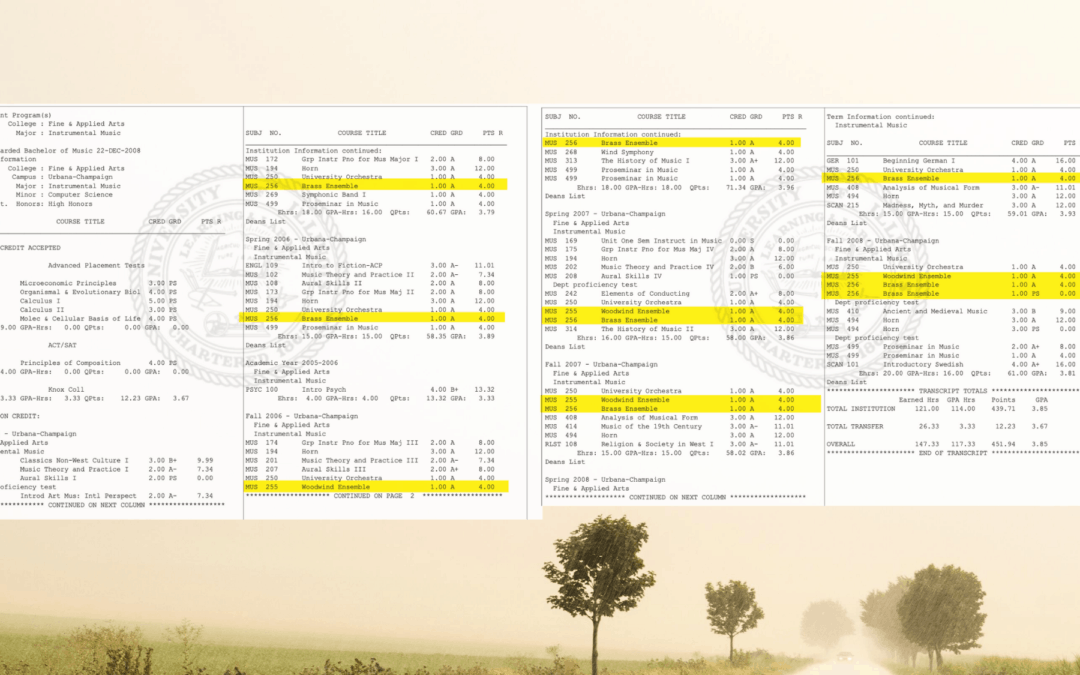
“Don’t look back; you’re not going that way.”
I disagree. A glance back at the things I learned in college every now and then never hurts, and can actually give you valuable insights around your best next move.
Looking back at my old college transcripts from 2008, I can now see patterns and tendencies that perfectly predicted how my twenties would unfold. And if you look past the letters and numbers on your own college track record, you’ll find important clues that can inform your future, too.
Here’s a snapshot of my transcript. At the time, I thought I was doing great — mostly A’s and B’s and I graduated a semester early. I didn’t see that there was trouble on the horizon. These are the things I learned in college.
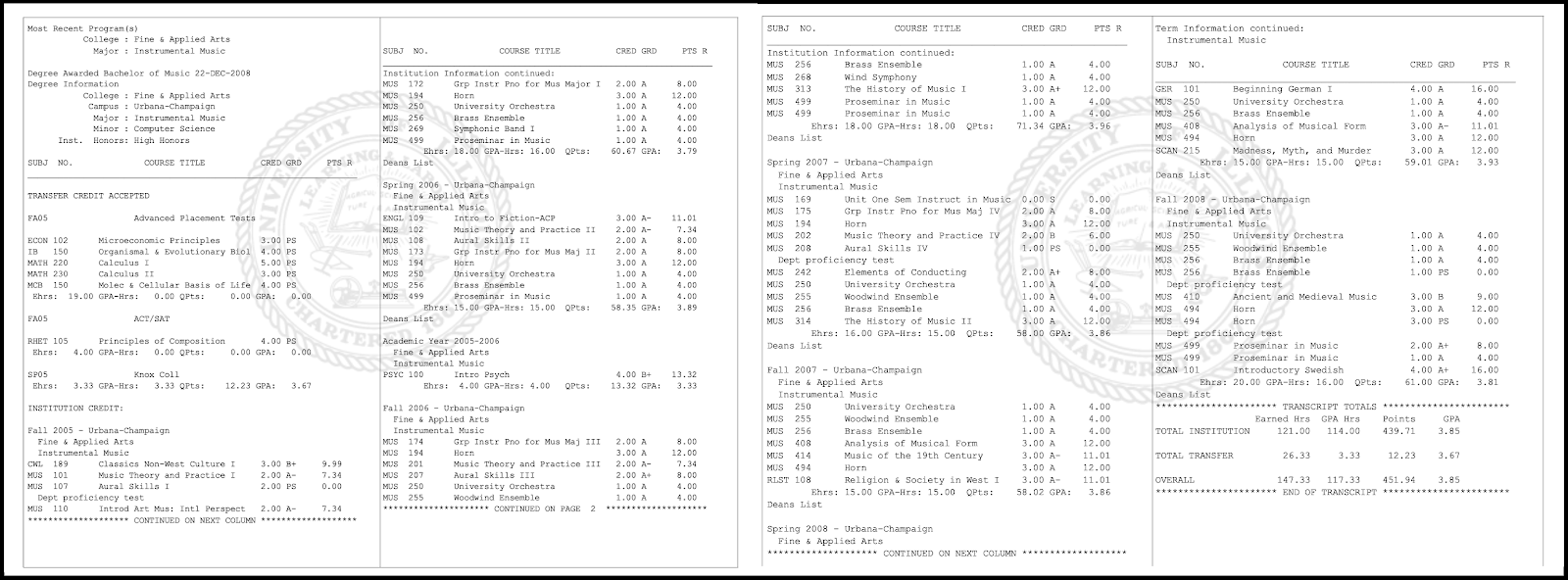
Screenshot from the author
What I could never have predicted was the 2008 recession and a complete pullback of job opportunities both in and outside of the arts. The utopia of dean’s list and special recognition was abruptly cut off by a dump truck of reality the moment I graduated. What had I done wrong?
It turns out, though, that the way I did college is exactly the way my career has unfolded and continues to unfold. Here are twelve outcomes, things I learned in college, my transcripts accurately foreshadowed as I navigated my twenties.
#1: Good college grades are a distraction
I needed to keep my grades up to conserve my scholarships. Growing up in a poor family, scholarships were the only reason I was even able to attend college (And I was pleased in 2018 to see my alma mater waive tuition for students whose families made under $60,000/year; our household income was around half of that).
That said, the pursuit of good grades can sometimes be an overcompensation trigger, an effort to prove to the world that “you are enough” because you’re insecure. This was definitely the case for me.
I always aimed to “learn the test,” and as a result I shunned spending more time exploring my interests, cultivating relationships, and volunteering. I regret this, and am now more mindful to not rearrange my life just to become a teacher’s pet.
#2: …But knowing what motivates you is really important
What I did glean from being a teacher’s pet, however, is that I’m a competitive person; games, challenges, and countdown clocks push me in a good way.
When I tried to remove the “Get all A’s” energy entirely and be zen all the time, I felt resentful and unsatisfied. Look for a happy medium in which you feel motivated and inspired by outcomes, but not completely beholden to them.
“Success is walking from failure to failure with no loss of enthusiasm.” — Winston Churchill
#3: How you mastered a skill in college is more important than the skill itself
Who came out of college with two thumbs and zero life skills? **points to self** This guy.
There’s not much variety in my transcript, but what you can see is that I focused on one thing: Playing the French horn really, really well. This deep learning turned out to be attractive to recruiters and employers because it showed patience and discipline.
Deeply learning the French horn translated well to other career pursuits over the years, and commitment to a craft projects confidence and integrity to prospective employers.
#4: …So show the things you learned in college off on your résumé
A résumé is not your work history, it’s a marketing document. The job of a résumé is to shape the perceptions of the reader. That means expanding on some details, like things I learned in college and leaving out others.
Don’t give a complete inventory of everything you did in your past job. Instead, illustrate how becoming good at something makes you more skilled at quickly picking up new skills. Showcase your ability to pick things up quickly.
#5: Determine whether you prefer small groups or big organizations
I was always a bigger fan of chamber music (Which includes small group ensembles, like string quartets or brass quintets) than playing in an orchestra, where 100 people followed a guy with a stick in his hand who made no sound. Chamber music can be a much more challenging career path because you have to create your income opportunities rather than collect a paycheck.
Upon reviewing my transcripts, the writing’s on the wall that I enjoyed the chaos of small-group experiences, because despite only two semesters of chamber music being necessary, I was enrolling myself again and again.
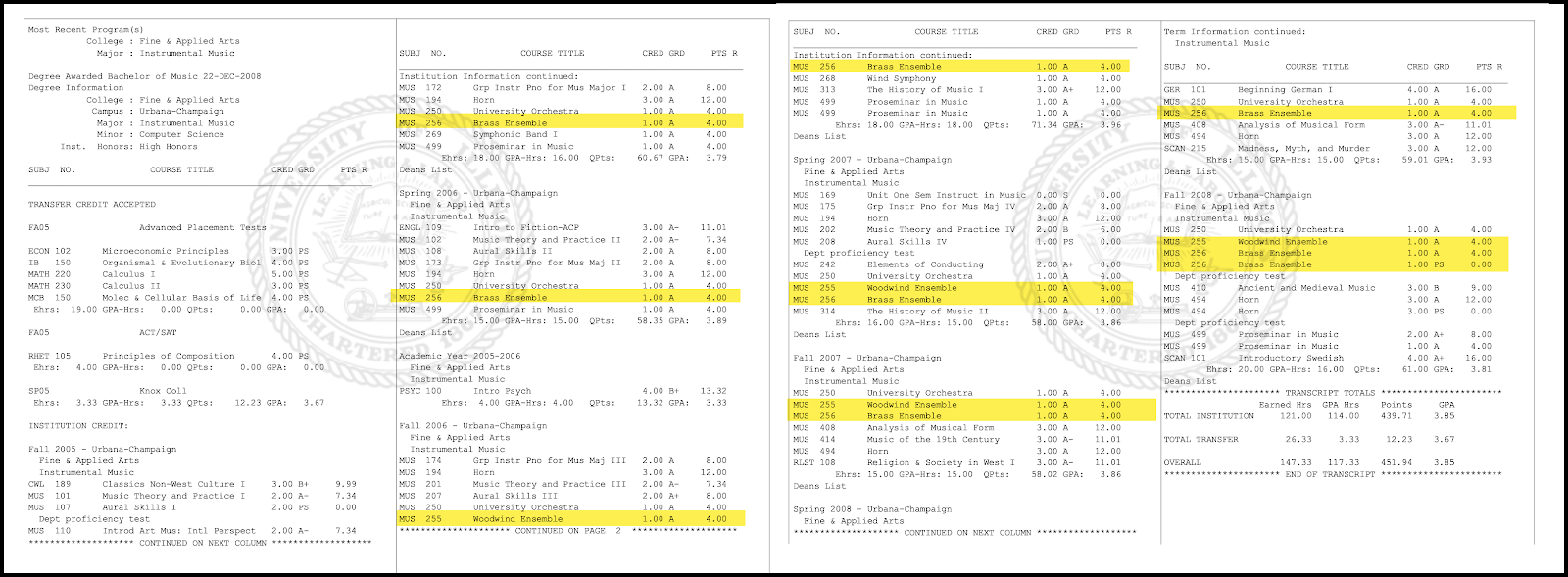
Screenshot from the author
This preference carried through into my career, but I didn’t see it at the time. When I had a job at a company with 50,000 employees, everything was already figured out and had a standard operating procedure, and it wasn’t interesting or inspiring. Working with 50 or even 5 employees, on the other hand, was messy and presented chances to flex my creativity.
For years I doubted myself and wondered if I should just go into a corporate environment for the sake of security and safety. But clearly, as evidenced by my transcripts and things I learned in college, that’s not fulfilling to me, which means it’s a dead-end.
Examine what kinds of experiences you naturally gravitate toward.
#6: …Then pursue post-grad experiences accordingly
Once you know this information, how can you continue to learn about that world of work? If you prefer corporate environments, study how to negotiate or join young professionals organizations. If you like small business (Or working for yourself), read up on how other entrepreneurs or small business owners get started.
“Your mind is a garden, your thoughts are the seeds. You can grow flowers or weeds.” — Osho
This also doesn’t have to be professional experience. Two of my most powerful experiences from my twenties were running an Ironman triathlon and completing a yoga teacher training. Neither experience was related to my career, but in both activities I befriended people who later became mentors or huge assets in my network.
#7: Look for ways around the system, based on what you learned in college
Nothing beats me down like being in a class or seminar and feeling bored out of my mind. Clearly I wanted to be the boss early on, because I appear to have submitted a self-guided learning proposal for “MUS 499 — Proseminar in music” seven times over seven semesters.
In fact, when counting up the credit hours, 28 out of 121 credit hours I took at undergrad — about 23% of my total on-campus studies — consisted of coursework I made up.
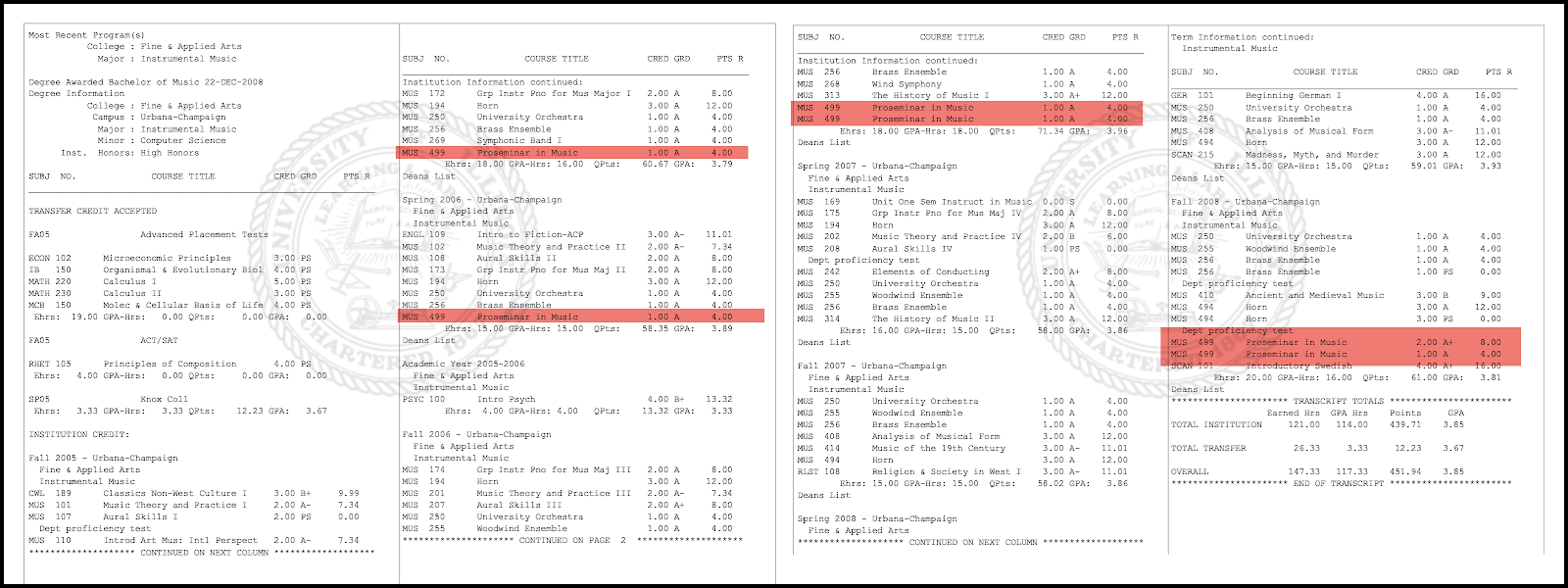
Screenshot from the author
The other good decision I made was to graduate a semester early and spend my final Spring networking, practicing, taking auditions, and taking a break from the classroom setting for the first time since I was five years old.
Time off without a sense of direction can be scary — and is sometimes forced under brutal circumstances, like what we’re all experiencing right now with stay-at-home directives — but can sometimes create space for unexpected newness.
#8: …And use that freedom to discover what you love.
In that semester off, a friend invited me to a yoga class. This friend had invited me several times before, and my response had always been “I don’t have time”. Now that I had time on my hands, I could say yes — and it turned out that I loved yoga.
Yoga really helped me curb my anxiety throughout my twenties, and I went on to teach it for about seven years. I would have never discovered that part of me had I not made space to explore and learn about different hobbies and passions.
Resist the urge to force these discoveries to happen. Let yourself be curious, with no agenda other than to learn, and see what arises.
#9: Create 30-day goals, 90-day goals, and 12-month goals
Five and ten-year goals are too long and difficult to create momentum around. Focus on shorter time periods instead; having one or two year-long goals is nice to help you think bigger and get out of your comfort zone.
In the second half of my college career, I wanted to go and study with a famous mentor in Norway. A Fulbright scholarship emerged as a way to accomplish this, so with about three semesters to go, I began consulting with the scholarships office on how to present the best possible scenario.
I remember my first essay drafts being so bad that the advisor nearly laughed me out of the office. “We have a long way to go. In the meantime, enroll in some coursework that implies your interest in other cultures and studies,” he suggested. Norwegian language coursework wasn’t offered at my university, but Swedish was, though only in fall semesters.
So I took some other Scandinavian studies classes and a semester of German to get a running start, and in the meantime built a relationship with the Scandinavian studies professor, who later wrote my letter of recommendation.
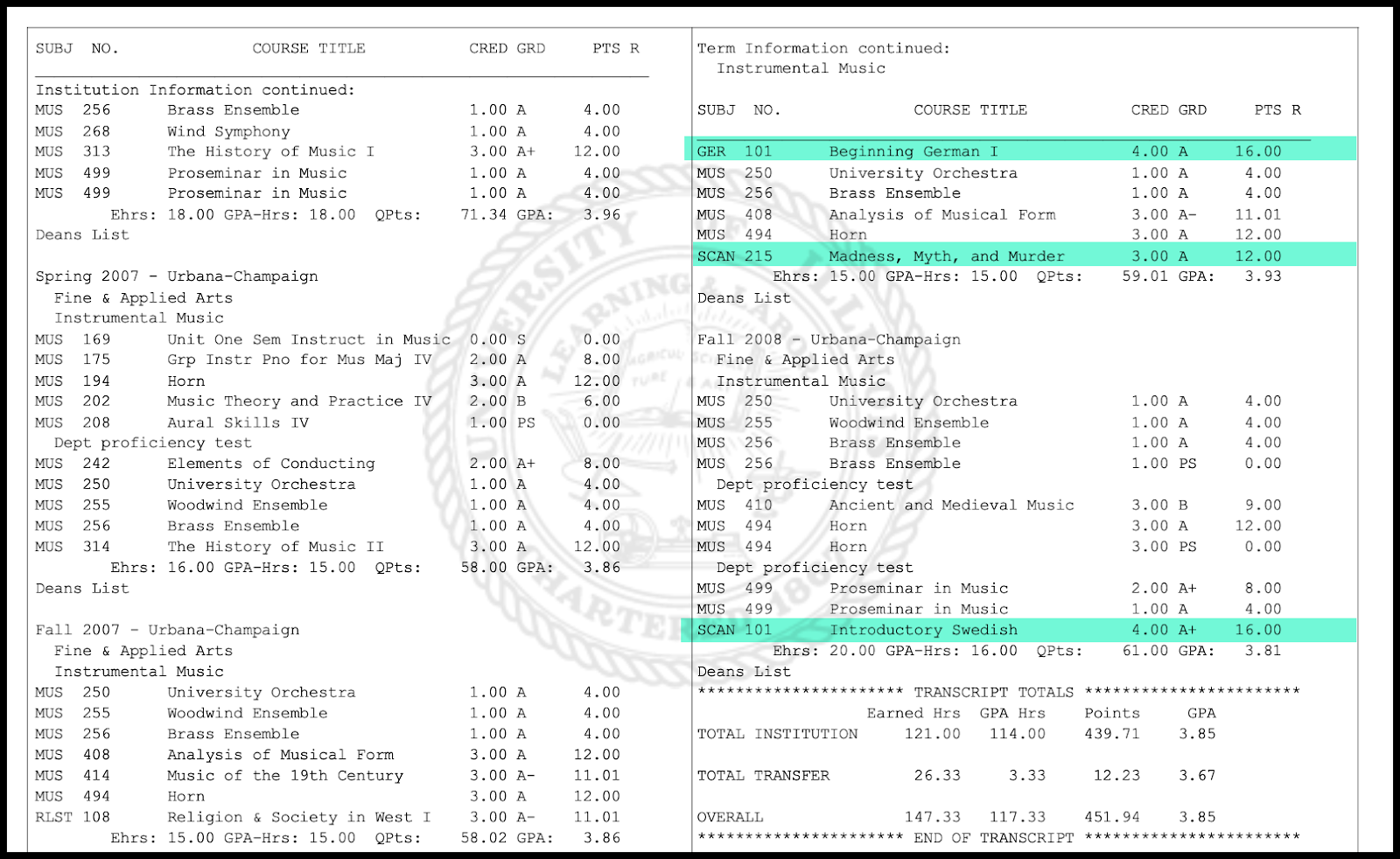
Screenshot from the author
Bit by bit, I worked at it. I also improved my essay writing a lot along the way, which helps me tremendously in my current career.
I ended up being first alternate for the Norway Fulbright in 2009. Not bad for having garbage essays on day one! I learned SO much along the way, and a supplemental class I took, “Madness, Myth, and Murder,” piqued my interest in true crime that remains to this day.
Set a mix of short-term and medium-term goals… but not super long-term ones. Even with all the things I learned in college. Life is unpredictable.
#10: …And find what makes you jump out of bed in the morning
Do you wake up every morning feeling uninspired? Change your life.
You know what I’m talking about. When you were a kid and it was Christmas morning or your birthday, it was not hard to jump out of bed with excitement.
This feeling is incredibly important. It’s actually the ultimate productivity hack. You’ll achieve far more and have a great time doing it when you’re excited about the future.
#11: College ceremonies are overrated
My college graduation ended in an explosive argument between my divorced parents, and I didn’t go to my Master’s degree graduation ceremony because I was so broke I couldn’t afford the $250 gown rental fee.
The problem with caring too much about ceremonies or “looking good” is that when it’s over, you’ll have a letdown. You’ll be smacked in the face with the real world, which doesn’t tell you “job well done” or give you a participation ribbon.
It’s okay to visualize standing on the podium, but don’t let that vision distract you from focusing on the work it takes to get there.
#12: …But daily rituals and routines are really underrated
In my first years of undergrad, my mentor had me document my practice sessions. It was in this self-study that I discovered little triggers that gave me great results in music and life.
I do my best work in the morning, preferably with a black coffee in hand. I can only concentrate for about 60–90 minutes at a time. Deep breathing exercises help me perform under pressure. All of these little rituals and things I learned about myself have remained in my life for over ten years.
“Integrity is doing the right thing even when no one is watching.” — C.S. Lewis
Develop awareness around how you work and what routines best support you, and cement those routines now rather than later.
Some grads regret going to college. I don’t.
I graduated with one of the most unemployable degrees on earth — two of them, actually, because then I went and got a Masters’ degree, too! — but the experiences I had in college perfectly predicted how my career would unfold.
Here’s a quick review:
- “Good grades” are a distraction, but knowing what motivates you is really important.
- How you mastered a skill is more important than the skill itself, so show that off on your résumé.
- Determine whether you prefer small groups or big organizations, then pursue post-grad experiences accordingly.
- Look for ways around the system, then use that freedom to discover what you love.
- Create 30-day goals, 90-day goals, and 12-month goals, and find what makes you jump out of bed in the morning.
- Ceremonies are overrated, but daily rituals and routines are really underrated.
Go back through your own track record and take a closer look. You may discover insights and patterns that will inform your career and future.

